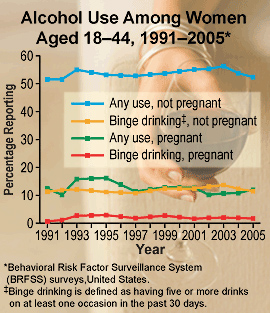Drinking While Pregnant Still a Problem
Alcohol use during pregnancy can cause birth defects and developmental disabilities. Women who are pregnant or might get pregnant should abstain from using alcohol.
 The number of women who drink alcohol while pregnant has not changed substantially over time, according to a 15 year-study by the Centers for Disease Control and Prevention. Approximately 1 in 8 women drank alcohol while pregnant, the study says.
The number of women who drink alcohol while pregnant has not changed substantially over time, according to a 15 year-study by the Centers for Disease Control and Prevention. Approximately 1 in 8 women drank alcohol while pregnant, the study says.
Alcohol consumption during pregnancy is a risk factor for poor birth outcomes including fetal alcohol syndrome, birth defects, and low birth weight (1). In the United States, the prevalence of fetal alcohol syndrome is estimated at 0.5 to 2.0 cases per 1,000 births, but other fetal alcohol spectrum disorders (FASDs)* are believed to occur approximately three times as often as fetal alcohol syndrome (2). The 2005 U.S. Surgeon General's advisory on alcohol use in pregnancy, advises women who are pregnant or considering becoming pregnant to abstain from using alcohol (2). Binge drinking is particularly harmful to fetal brain development (2,3). To examine the prevalence of any alcohol use and binge drinking‡ among pregnant and nonpregnant women of childbearing age in the United States and to characterize the women with these alcohol use behaviors, CDC analyzed 1991–2005 data from Behavioral Risk Factor Surveillance System (BRFSS) surveys.
The findings indicated that the prevalence of any alcohol use and binge drinking among pregnant and nonpregnant women of childbearing age was little changed from 1991 to 2005. By sociodemographic characteristic, during 2001–2005, the highest percentages of pregnant women reporting any alcohol use were aged 35–44 years (17.7%), college graduates (14.4%), employed (13.7%), and unmarried (13.4%). Health-care providers should routinely ask women of childbearing age about alcohol use, inform them of the risks of drinking alcohol while pregnant, and advise them not to drink alcohol while pregnant or if they might become pregnant (2,4).
*FASD is an umbrella term that describes the range of effects that can occur in an individual whose mother drank alcohol during pregnancy. These effects include physical, mental, behavioral, or learning disabilities with possible lifelong implications. The term FASD is not intended for use as a clinical diagnosis.
‡Any alcohol use is defined as having at least one drink of any alcoholic beverage in the past 30 days. Binge drinking is defined as having five or more drinks on at least one occasion in the past 30 days.
- Bailey BA, Sokol RJ. Pregnancy and alcohol use: evidence and recommendations for prenatal care. Clin Obstet Gynecol 2008;51:436–44.
- US Department of Health and Human Services. US Surgeon General releases advisory on alcohol use in pregnancy. Washington, DC: US Department of Health and Human Services; 2005. Available at http://www.surgeongeneral.gov/pressreleases/sg02222005.html.
- Maier SE, West JR. Drinking patterns and alcohol-related birth defects. Alcohol Res Health. 2001;25:168–74.
- US Department of Health and Human Services and US Department of Agriculture. Dietary guidelines for Americans 2005. Washington, DC: US Department of Health and Human Services; 2005. Available at http://www.health.gov/dietaryguidelines/dga2005/document/default.htm.
Data Source: CDC. Alcohol Use Among Pregnant and Nonpregnant Women of Childbearing Age --- United States, 1991--2005. MMWR 58(19);529-532.
More Information
- CDC Fetal Alcohol Spectrum Disorders Site
- CDC Feature: Here's to an Alcohol-Free Pregnancy!
- MMWR Article on Alcohol Use Among Pregnant and Nonpregnant Women of Childbearing Age
- Podcast: Alcohol and Pregnancy Don't Mix [PODCAST - 2:32 minutes] (2009)
- A Minute of Health with CDC [PODCAST - 0:59 seconds]
- A Cup of Health with CDC [PODCAST - 3:50 minutes]
- CDC articles on fetal alcohol spectrum disorders and alcohol and pregnancy
- Free educational materials
CDC works 24/7 saving lives and protecting people from health threats to have a more secure nation. A US federal agency, CDC helps make the healthy choice the easy choice by putting science and prevention into action. CDC works to help people live longer, healthier and more productive lives.
Get email updates
To receive email updates about this page, enter your email address:
Contact Us:
- Centers for Disease Control and Prevention
1600 Clifton Rd
Atlanta, GA 30333 - 800-CDC-INFO
(800-232-4636)
TTY: (888) 232-6348 - cdcinfo@cdc.gov



